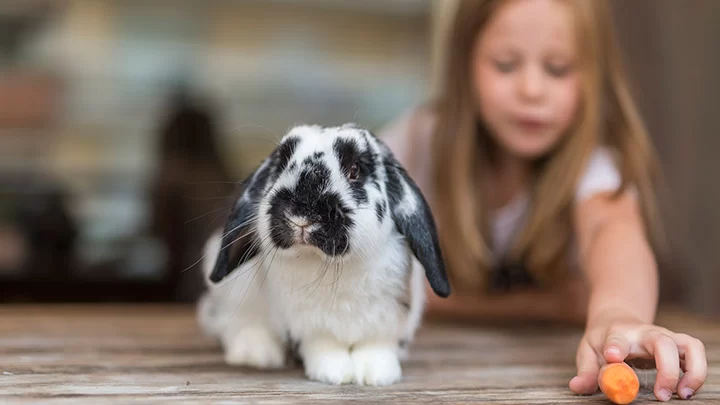Best Diets for Pet Rabbits with Digestive Problems: Improve Your Rabbit's Digestion
- Understanding the Rabbit's Digestive System
- Common Digestive Issues in Pet Rabbits
- Best Foods for Rabbits with Digestive Problems
- Foods to Avoid for Rabbits with Sensitive Stomachs
- Real-Life Stories of Rabbits with Digestive Issues
- Recommended Products for Rabbit Digestive Health
1. Understanding the Rabbit's Digestive System
Rabbits have a highly specialized digestive system that requires a balanced diet to function properly. They are hindgut fermenters, meaning most of their digestion occurs in the cecum, a large pouch located near their intestines. This pouch is essential for fermenting fiber from hay and other plant-based foods, which provides essential nutrients. Therefore, it’s critical to provide them with a diet that promotes healthy digestion.
Rabbits require high-fiber foods to support their digestive process, particularly hay. A lack of fiber in their diet can lead to digestive problems, such as gastrointestinal stasis, a condition where the digestive system slows or stops entirely. Understanding the role of fiber and the balance of different nutrients is crucial to keeping your pet’s digestion in check.
2. Common Digestive Issues in Pet Rabbits
Many pet rabbits experience digestive problems at some point. Some common issues include:
- Gastrointestinal Stasis: This is a condition where the digestive system slows down or stops working. It is a serious issue and can be caused by stress, dehydration, or a poor diet.
- Diarrhea: Diarrhea is often a sign of a dietary imbalance, infection, or stress. It is crucial to address this quickly to prevent dehydration and discomfort.
- Bloating: Rabbits may experience bloating, which is often linked to digestive sluggishness or a diet too high in starchy foods like carrots or fruit.
- Poopy Butt: Excessive soft feces stuck to the rabbit’s rear can be caused by too much sugary food or an imbalance in their diet.
Understanding these common digestive issues can help you identify and address problems early, ensuring your rabbit stays healthy and happy.
3. Best Foods for Rabbits with Digestive Problems
Providing the right foods for rabbits with digestive problems is essential for promoting gut health. Here are some of the best options for your rabbit’s digestive well-being:
- Timothy Hay: The best food for rabbits, particularly for those with digestive issues, is high-quality hay, such as Timothy hay. Hay is high in fiber and helps to keep the digestive system moving and healthy.
- Leafy Greens: Fresh, fiber-rich leafy greens, such as romaine lettuce, cilantro, and parsley, are great for encouraging healthy digestion. Avoid overfeeding high-oxalate greens like spinach.
- Herbs: Many herbs, like mint and basil, can help stimulate your rabbit’s digestive system, and they are easy to add to their diet as treats.
- Pellets with High Fiber: If you use pellets, ensure they are high in fiber and free from fillers like seeds or dried fruits, which can upset the digestive balance.
These foods provide the necessary fiber and nutrients to support digestion, prevent constipation, and promote overall gastrointestinal health.
4. Foods to Avoid for Rabbits with Sensitive Stomachs
While some foods are beneficial, others can cause digestive issues for rabbits, especially those with sensitive stomachs. Here’s a list of foods you should avoid:
- High-Sugar Foods: Fruits and vegetables high in sugar, such as carrots and apples, can cause diarrhea and bloating in some rabbits.
- Leafy Greens with High Oxalates: Spinach and beet greens, for example, can cause kidney problems or bladder issues if fed in excess due to their high oxalate content.
- Processed Foods: Avoid feeding your rabbit any processed foods, including commercial rabbit treats that are high in sugar, additives, or artificial ingredients.
- Cabbage and Cruciferous Vegetables: While nutritious, cabbage, broccoli, and other cruciferous vegetables can cause gas and discomfort in some rabbits.
By avoiding these foods, you can help ensure that your rabbit’s digestive system remains in optimal condition and prevent unnecessary discomfort or health problems.
5. Real-Life Stories of Rabbits with Digestive Issues
Many rabbit owners have shared their experiences with digestive issues and the steps they took to resolve them. For example, Lisa, a rabbit owner from Florida, found that her rabbit suffered from bloating and lethargy after a diet high in sugary fruits:
"I had no idea that feeding my rabbit too many fruits was causing his digestive issues. After switching to a high-fiber, hay-based diet, I noticed a huge improvement in his health. His energy levels returned, and the bloating stopped. It was a game-changer."
Lisa’s story is a reminder of how important diet is in maintaining a rabbit's digestive health and how small changes can make a big difference.
6. Recommended Products for Rabbit Digestive Health
If you’re looking to enhance your rabbit’s diet and support their digestive health, here are some excellent products to consider:
- Oxbow Timothy Hay – A high-fiber hay that’s ideal for rabbits with digestive issues, promoting healthy digestion and preventing gastrointestinal stasis.
- Kaytee Forti-Diet Pro Health Rabbit Pellets – A fiber-rich pellet option designed to support digestive health, especially for rabbits with sensitive stomachs.
- Rabbit Digestive Support Tablets – These tablets provide digestive enzymes and probiotics to help improve digestion and alleviate gastrointestinal issues.
These products are carefully designed to support your rabbit’s digestive health and keep them feeling their best. Learn more about digestive health for rabbits at Hidden Brook Veterinary.
By choosing the right foods and supporting your pet’s digestive health with proper care, you can ensure your rabbit stays happy and healthy. Learn more about rabbit care and find digestive support products at Hidden Brook Veterinary.










